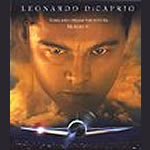The Aviator (2004, Martin Scorsese)
It is utterly criminal that Martin Scorsese does not yet have a Best Director Oscar with his name on it. It upsets me a bit that the film that finally gets him the statue may be one that was developed by several other people before Scorsese was attached, but it nevertheless has his stamp all over it.
The Aviator is lush but speedy, long but never sprawling, and as thrilling as any of the director’s more murderous pictures. Leonardo DiCaprio (whose Appian Way films produced the movie) leads us on a physical and emotional roller coaster as Howard Hughes, the millionaire director/aviation mogul who wanted to “make the biggest movies, fly the fastest planes, and be the richest man in the world.” He also managed to date some of the world’s most beautiful women, including Jean Harlow (Gwen Stefani, in her two-minute acting debut), Ava Gardner (Kate Beckinsale, with an accent somewhere between North Carolina and Transylvania), and most notably, Katherine Hepburn (Cate Blanchett, who ought to run away with an Oscar of her own). The ubiquitous Jude Law makes a cameo as well, as Errol Flynn.
Most people remember Hughes for his later days, spent locked away in an obsessive-compulsive haze. The Aviator is concerned with his younger days, and shows us the beginnings of the descent into madness and how a man that had everything went so horribly wrong.
DiCaprio is back in What’s Eating Gilbert Grape form, going from slick to crazy in the blink of an eye, and making the sometimes despicable Hughes a man we never stop pulling for–even knowing the way Hughes’ story wound up, you hope for some sort of happy ending. Alec Baldwin and Alan Alda, as rival Pan Am honcho Juan Trippe and the U.S. Senator in his pocket, respectively, serve as villains for a large part of the picture, but the real villains are the compulsions and tics, the darkness in Hughes’s mind creeping closer and closer to the surface, and that is Scorsese’s territory. Not since Taxi Driver has he given us a hero so compelling, such a close examination of the little things that send a man over the edge, and kept an audience so entranced with a character that most of us could never relate to. After all, Hughes was a millionaire playboy and a war profiteer.
The film is a visual banquet, from the flight scenes that actually made my stomach lurch and my knuckles go white from gripping the armrests to the beautifully made-up stars and sumptuous sets. Footage from actual Hughes films Hell’s Angels (at its time the most expensive picture ever made) and The Outlaw (most famous for Jane Russell’s “mammaries”) appears as well, though the filmmakers made quite sure not to juxtapose the modern-day actors and actresses with the people they’re playing. The Aviator is worth seeing for the visuals alone, but it’s far more than just eye candy. It’s a trip through the rot at the heart of the American Dream, a parable about what money can and can’t buy, and for the most part it’s a true story. Look for Marty when the Oscars roll around. My bet’s on him.



